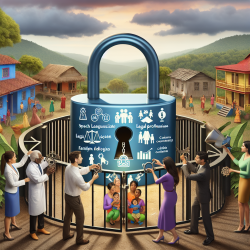Introduction
In the realm of speech-language pathology, data-driven decisions are crucial for creating effective interventions and improving outcomes for children. However, the broader context in which these children and their families live can significantly impact their well-being. A recent research article titled "Blocking the Law from Within: Familyism Ideologies as Obstacles to Legal Protections for Women in El Salvador, Guatemala, Honduras, and Nicaragua" sheds light on the challenges faced by women in Central America due to entrenched familyism ideologies. These ideologies prioritize family unity over women's rights, impacting the effectiveness of Violence Against Women (VAW) laws. As practitioners, understanding these dynamics can enhance our ability to support children and their families effectively.
Understanding the Research
The research highlights how familyism ideologies, which prioritize family unity at the expense of women's rights, undermine the effectiveness of VAW laws in Central America. Despite the existence of numerous laws aimed at protecting women, these laws often fail due to their inferior positioning within the legal hierarchy and the language used in their crafting. This results in a legal framework that delays, undermines, diminishes, or renders abstract the effectiveness of VAW laws.
Implications for Practitioners
For practitioners working with children and families, understanding the socio-legal context is essential. Here are some ways this research can inform your practice:
- Awareness of Legal Context: Recognize the impact of familyism ideologies on the legal protections available to women and how this might affect the families you work with.
- Advocacy and Support: Advocate for policies and practices that prioritize the rights and safety of women, which in turn supports healthier family dynamics and better outcomes for children.
- Interdisciplinary Collaboration: Collaborate with legal professionals, social workers, and community organizations to address the broader systemic issues affecting the families you serve.
Encouraging Further Research
This research underscores the importance of examining the legal and social structures that impact the effectiveness of laws designed to protect women. Practitioners are encouraged to engage in further research to explore how these dynamics play out in different contexts and to develop strategies for addressing these challenges. By staying informed and involved in ongoing research, practitioners can contribute to creating a more equitable and supportive environment for children and their families.
Conclusion
Understanding the impact of familyism ideologies on the effectiveness of VAW laws is crucial for practitioners aiming to improve outcomes for children and families. By integrating this knowledge into practice, advocating for systemic change, and engaging in further research, practitioners can play a vital role in creating a safer and more supportive environment for all family members. To read the original research paper, please follow this link: Blocking the Law from Within: Familyism Ideologies as Obstacles to Legal Protections for Women in El Salvador, Guatemala, Honduras, and Nicaragua.










